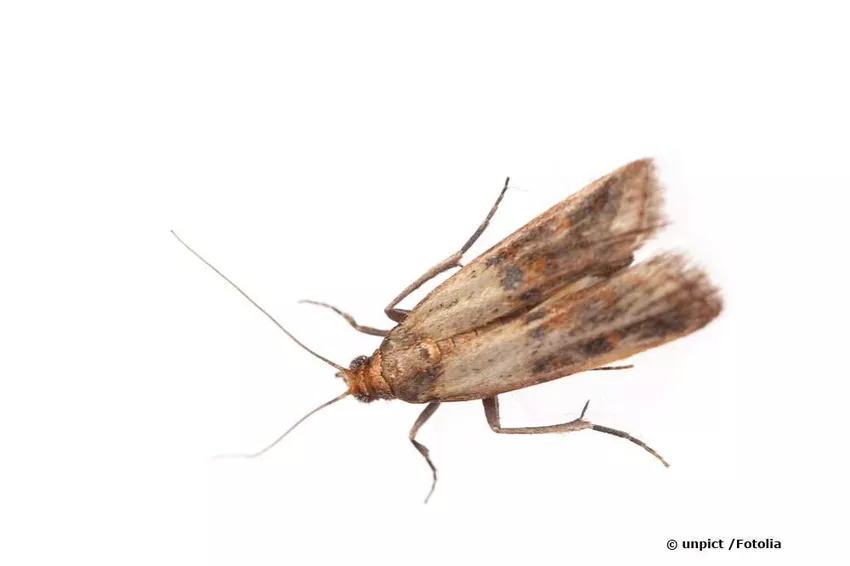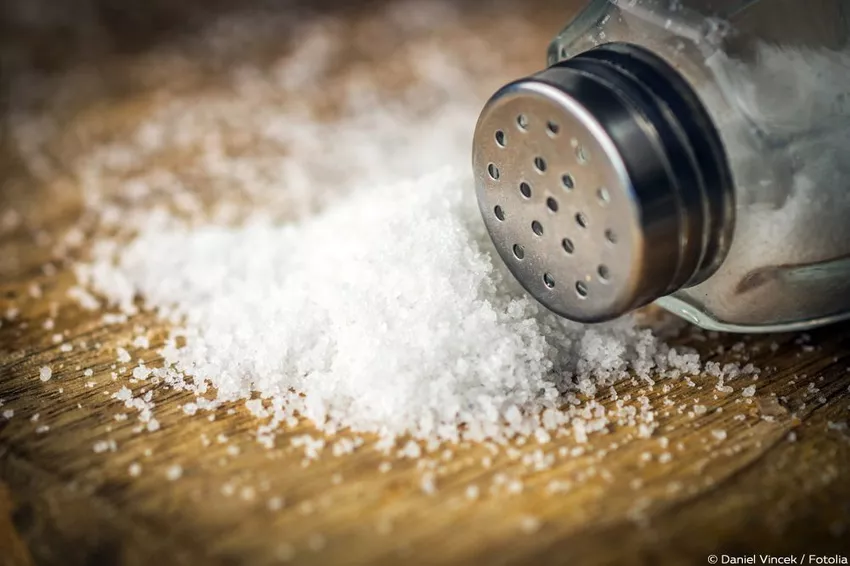- Possible insects in the kitchen
- First of all: dispose of maggots
- After disposal
- 6 home remedies for worms
- Preventive measures after elimination

Oh my godness! White worms in the kitchen are alarming and nauseous. If you discover maggots, you should do something, because in an emergency it can lead to a permanent settlement.
Possible insects in the kitchen
Larvae, caterpillars, worms. There are many names for the early life stages of insects that can stray into your premises. Insects often use kitchens to lay their eggs, as there is sufficient food for the white brood. There are two groups of flying insects in kitchens whose offspring cause disgust:
 Dried fruit moth, Plodia interpunctella
Dried fruit moth, Plodia interpunctella
- To fly
- food moth
While flies lay their eggs on leftover food, faeces (litter box) or rubbish, moths look for dry food. These include, for example, oatmeal or nuts. For this reason, white caterpillars are more often found in cupboards, since such food is mostly stored there. Fly larvae, on the other hand, are more prevalent in summer when it is warm and humid. Fortunately, the same methods and home remedies work against the larvae and caterpillars of each group.
First of all: dispose of maggots
Before you use home remedies, you should simply dispose of the worms. Since they are not dangerous to humans, they are disposed of mechanically, making short work of the pests. To do this, proceed as follows:
- locate maggots
- Use dustpan and broom
- pour into a bag or box
- dispose of or abandon
In this way, larger quantities in particular can be removed without having to touch them. Smaller quantities, on the other hand, can easily be collected by hand. You can easily put the larvae and caterpillars in the garden if disposal seems too complicated. In this case, predators such as birds will be happy about the insects as a snack. If you do not want to remove live larvae, you should use one of the home remedies below.
After disposal
White caterpillars and larvae are shed from the adult specimens in two different ways:

- targeted
- in laying distress
Targeted storage in the kitchen proves to be a problem, since the insects have suitable and easily accessible food sources at their disposal. When they do, they settle in and can occupy even hard-to-reach crevices, making it difficult to completely dispose of them. If there is a laying emergency, as can often occur with flies, you will only find small groups in places that are actually not suitable for breeding. After a few days, no new maggots should appear at the said spot. This can also be seen from the following points:
- unsuitable place (e.g. no cracks as a settlement option)
- lack of odor formation
- lack of food sources
Therefore, check whether the colonization of the worms is targeted. If so, you should take one of the steps below to get rid of the white spawn in your kitchen.
Notice: In all likelihood, the larvae will not only settle in your kitchen premises. You should look wherever there is suitable food and nesting places for insects in the house.
6 home remedies for worms
If you discover the white spawn, there are various home remedies that can be used after disposal. With these, the egg-laying of other adult animals is prevented, and eggs that have not yet hatched are destroyed. In addition, the worms will die if they come into contact with the remedies, which is particularly recommended if the crawling becomes too much for you. This means you only have to wait a little before the maggots can be disposed of. 6 remedies against whiteworms in the kitchen are at your disposal.
Notice: To prevent other flies or moths from settling there for a short time, you should let scented oils evaporate in the kitchen or place them in small bowls. Oils made from lavender, laurel or peppermint are particularly well suited for this purpose, as they avoid the adult insects, which prevents possible egg laying.
salt

One of the classic home remedies for white caterpillars or larvae is conventional salt. Due to the easy availability, you can do something about the animals immediately. The method is suitable for any surface and a wide variety of containers, which makes the spice so effective in the fight against insect larvae. The reason: salt deprives the animals of the moisture they need to survive. They dry up and can then be disposed of without any disgust. Proceed as follows:
- Sprinkle salt liberally on maggots
- Exposure time: about 2 hours
- dispose of dead worms
- clean up
Watch out for more larvae in the following days, because there may still be eggs nearby. If necessary, repeat the procedure until your kitchen is worm-free.
vinegar solution
A standard of home remedies is the vinegar solution. You can use it to make short work of the worms, as the acid acts like a natural insecticide on the worms. In addition, treated surfaces and rooms are avoided by the adult specimens because they cannot tolerate the smell. The production succeeds in the following way:
- Pour 1 liter of water into a spray bottle
- Add 4 tablespoons vinegar essence
- optional: mix in 2 to 3 tablespoons of spirit
- increases the effect
- Close the bottle and shake well

Now you can spray the agent on the maggots immediately. After some time, the animals die and can be removed. Then clean the surface well with the vinegar solution to remove any eggs.
Notice: During the warm months, clean your worktops and cupboards in the kitchen more often with the vinegar solution. This creates an odor barrier that keeps the flies and moths out.
kieselguhr
If you still have diatomaceous earth available, you should use it against the larvae. It also binds moisture like salt, but is much stronger, which even a large concentration of animals can handle without any problems. In addition, it is not harmful to surfaces and people, which makes it easy to use. Diatomaceous earth is applied in the same way as salt, but the exposure time is two to three hours. Then proceed as described above.
pepper broth
Another home remedy is pepper broth, which does not dry out the worms. The spice kills the larvae due to the ingredients it contains, which works much faster than salt or diatomaceous earth. The pepper stock is made with the following recipe:
 black peppercorns
black peppercorns
- Boil 1 liter of water
- Add 4 tablespoons of pepper to the water
- ground or grain does not matter
- cook until ground pepper has dissolved
- cook for a few minutes with peppercorns
- Strain peppercorns
- Let the soup cool down
- fill in spray bottle
You then spray the maggots with the liquid and now have to wait a little longer until they die. You can then dispose of them as already described. Clean the surface with the pepper broth to make further colonization more difficult.
slaked lime
A good way to get rid of white maggots is to use slaked lime. Slaked lime can be used primarily against worms, which have settled in large numbers in your garbage can or other containers. The powder robs the maggots of all moisture, preventing them from pupating and dying. You should wear protective clothing when using:
- gloves
- mouthguard
- long sleeve top
 gloves
gloves
To get rid of the larvae and caterpillars, sprinkle the slaked lime thickly on the animals and leave the powder to work for an hour. After this period the worms should have dried up and can be discarded along with the contents of the container. This is followed by a thorough cleaning.
Preventive measures after elimination
So that you don't have to be disgusted by the uninvited guests again, it is advisable to take the right precautions before settling further. There are a number of measures that make egg-laying unlikely, as they specifically prevent the adult animals from doing so. The focus is on steps that reduce the formation of attractants that attract flies and moths. The preventive measures also prevent access to food and suitable places for laying eggs. The following list introduces you to a few points:
- Do not store food openly
- Store dry food in sealable containers
- Store perishable food in a cool place
- Discard overripe fruit
- Trash can with lid
- take out organic waste every day or every other day on warm days
- Wash out the organic waste container thoroughly (do not forget the bottom)
- Clean pet bowls after each meal
- Clean the litter box regularly
- Close the dishwasher door
- Remove leftover food from the floor or in crevices

In general, the kitchen should be as clean as possible, because then your premises are unattractive to insects. Keeping your garbage cans worm-free can help in the summer, as the resulting adult specimens could easily find their way into your kitchen.